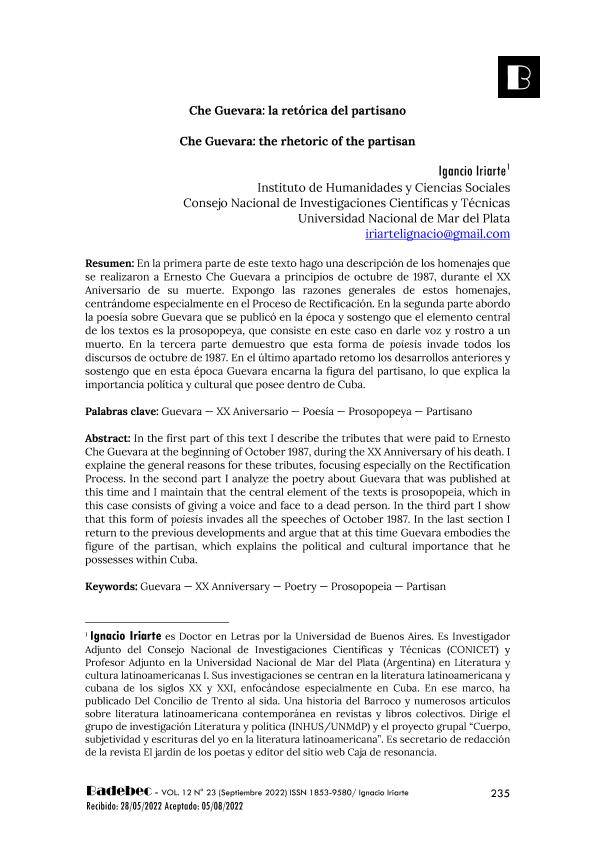Mostrar el registro sencillo del ítem
dc.contributor.author
Iriarte, Luis Ignacio

dc.date.available
2023-07-24T13:35:30Z
dc.date.issued
2022-09
dc.identifier.citation
Iriarte, Luis Ignacio; Che Guevara: La retórica del partisano; Universidad Nacional de Rosario. Facultad de Humanidades y Artes. Centro de Estudios de Teoría y Crítica Literaria; Badebec; 12; 23; 9-2022; 235-259
dc.identifier.issn
1853-9580
dc.identifier.uri
http://hdl.handle.net/11336/204995
dc.description.abstract
En la primera parte de este texto hago una descripción de los homenajes que se realizaron a Ernesto Che Guevara a principios de octubre de 1987, durante el XX Aniversario de su muerte. Expongo las razones generales de estos homenajes, centrándome especialmente en el Proceso de Rectificación. En la segunda parte abordo la poesía sobre Guevara que se publicó en la época y sostengo que el elemento central de los textos es la prosopopeya, que consiste en este caso en darle voz y rostro a un muerto. En la tercera parte demuestro que esta forma de poiesis invade todos los discursos de octubre de 1987. En el último apartado retomo los desarrollos anteriores y sostengo que en esta época Guevara encarna la figura del partisano, lo que explica la importancia política y cultural que posee dentro de Cuba.
dc.description.abstract
In the first part of this text I describe the tributes that were paid to Ernesto Che Guevara at the beginning of October 1987, during the XX Anniversary of his death. I explaine the general reasons for these tributes, focusing especially on the Rectification Process. In the second part I analyze the poetry about Guevara that was published at this time and I maintain that the central element of the texts is prosopopeia, which in this case consists of giving a voice and face to a dead person. In the third part I show that this form of poiesis invades all the speeches of October 1987. In the last section I return to the previous developments and argue that at this time Guevara embodies the figure of the partisan, which explains the political and cultural importance that he possesses within Cuba.
dc.format
application/pdf
dc.language.iso
spa
dc.publisher
Universidad Nacional de Rosario. Facultad de Humanidades y Artes. Centro de Estudios de Teoría y Crítica Literaria
dc.rights
info:eu-repo/semantics/openAccess
dc.rights.uri
https://creativecommons.org/licenses/by-nc-sa/2.5/ar/
dc.subject
GUEVARA
dc.subject
POESÍA
dc.subject
PROSOPOPEYA
dc.subject
PARTISANO
dc.subject.classification
Literaturas Específicas

dc.subject.classification
Lengua y Literatura

dc.subject.classification
HUMANIDADES

dc.title
Che Guevara: La retórica del partisano
dc.title
Che Guevara: The rhetoric of the partisan
dc.type
info:eu-repo/semantics/article
dc.type
info:ar-repo/semantics/artículo
dc.type
info:eu-repo/semantics/publishedVersion
dc.date.updated
2023-07-07T18:39:28Z
dc.journal.volume
12
dc.journal.number
23
dc.journal.pagination
235-259
dc.journal.pais
Argentina

dc.journal.ciudad
Rosario
dc.description.fil
Fil: Iriarte, Luis Ignacio. Consejo Nacional de Investigaciones Científicas y Técnicas. Centro Científico Tecnológico Conicet - Mar del Plata. Instituto de Humanidades y Ciencias Sociales. Universidad Nacional de Mar del Plata. Instituto de Humanidades y Ciencias Sociales; Argentina
dc.journal.title
Badebec
dc.relation.alternativeid
info:eu-repo/semantics/altIdentifier/url/https://badebec.unr.edu.ar/index.php/badebec/article/view/573
dc.relation.alternativeid
info:eu-repo/semantics/altIdentifier/doi/https://doi.org/10.35305/b.v12i23.573
Archivos asociados
